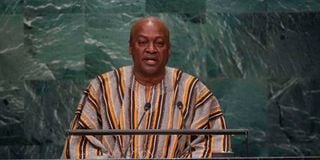AU appoints Ghana ex-President John Mahama as envoy to Somalia

John Dramani Mahama, the then President of Ghana, addresses the UN General Assembly Debate on September 21, 2016 at the United Nations in New York.
What you need to know:
The appointment comes just days after a special envoy from the office of the Qatar Foreign minister, Mutlaq bin Majed Al-Qahtani, was sent to Somalia to engage with the country's political rivals.
Mogadishu,
The African Union (AU) has appointed former Ghanaian President John Dramani Mahama as its high representative to Somalia, to help mediate between stakeholders who have failed to agree on an electoral calendar and on who should manage the polls.
AU Commission chair Moussa Faki Mahamat made the announcement in a statement on Saturday, saying Mahama will work with Somali stakeholders to reach a mutually acceptable compromise towards an all-encompassing resolution to the elections stalemate in the shortest possible time.
“In fulfilling his mandate, Mahama will be supported by the peacekeepers serving under the African Union Mission in Somalia (Amisom) to ensure mediation efforts and the peace support operation work together seamlessly,” he said.
The AU hopes the appointment will ensure democracy in Somalia and help curb the threat to the stability of the country and the region as a whole.
Parliamentary elections were initially to take place in 2020 and the presidential election in February 2021, but both were delayed due to squabbles among stakeholders and disagreements on modalities for voting.

Somali military force members supporting anti-government opposition leaders gather before leaving to their bases in Mogadishu, Somalia, on May 7, 2021.
Internal disagreements
Initially, Federal President Mohamed Abdullahi Farmaajo and the Lower House of Somalia’s bicameral parliament preferred a one-man, one-vote universal suffrage.
There were some who preferred an indirect election whereby delegates selected from clans would elect members of Parliament.
But discussions between President Farmaajo and the presidents of the five Federal Member States (FMS) - Galmudug, Hirshabelle, Puntland, Southwest and Jubbaland - as well as the Mayor of Mogadishu in Dusamareb, an upcountry town in Central Somalia, an agreement was signed on September 17, 2020, paving the way for an indirect election to be held in the Horn of Africa nation in 2021.
However, squabbles emerged when the parties started to discuss on how to implement the agreement, particularly when Puntland’s leader Said Abdullahi Deni and Ahmed Mohamed Madobe of Jubbaland opposed Farmaajo’s position.
A number of attempts to solve the impasse produced no tangible outcomes, even after the Federal Government of Somalia and FMS held meetings in the capital, Mogadishu.
On April 12, a dramatic change occurred when the legislators of the Lower House of Parliament, popularly known as Golaha Shacabka (Peoples’ Hall) convened and voted for the extension of Parliament’s terms and Farmaajo’s ternure, while urging the National Independent Election Commission to hold a one-man, one-vote election in not more than two years.
Pressure on Farmaajo
The move technically abolished the indirect electoral modality enshrined in the September 17 agreement.
The two-year extension granted to Farmaajo immediately generated a heated opposition from Punland and Jubbland as well as other political stakeholders like the Coalition of the (opposition) Presidential Candidates (CPC) that includes former Somali presidents Sharif Sheikh Ahmed and Hassan Sheikh Mohamoud and ex-Prime Minister Hassan Ali Khaire.
Soon after the extension, the Somali leader whose four-year term expired on February 8 jetted off from Mogadishu to Kinshasa where he met with DR Congo President Felix Tshisekedi, who is the current AU chair.
Following discussions, President Tshisekedi accepted Farmaajo’s view that African problems must have African solutions, thus requesting the AU to intervene in the electoral impasse in Somalia.
The fruits of the request appeared to material when on April 20, UN Security Council members rejected President Farmaajo’s term extension but endorsed the AU’s efforts to help parties resolve the electoral impasse.
The consistent pressure forced Farmaajo to address the Lower House of Parliament, which eventually voted to revoke the term extension.

Somalia's members of Parliament attend a special assembly where the president is requesting for the abandonment of the two-year extension of his presidential term and the immediate elections to ease the recent political crisis at Villa Hargeisa in Mogadishu on May 1, 2021.
Mahama's big task
The UN and AU’s suggestions culminated in Mahama’s appointment to mediate in issuing the Somali sides are grappling with.
The appointment comes just days after a special envoy from the office of the Qatar Foreign minister, Mutlaq bin Majed Al-Qahtani, was sent to Somalia to engage with the country's political rivals.
More on this: Qatari special envoy in Somalia over electoral impasse
The renowned strategist’s visit to Mogadishu enabled him to meet with Farmaajo, PM Mohamed Hussein Roble, representatives from opposition groups and most of the leaders of the FMS as well as the mayor of Mogadishu.
Al-Qahtani’s intervention seemed to have neutralised the military confrontations between forces loyal to the opposition and the State’s security personnel.
On Friday, the opposition loyalists who originally deserted the military posts, especially in the Middle Shabelle region, north of Mogadishu, left the trenches in the capital in obedience to the demilitarisation requested by PM Roble.
Aidarus Hassan, a Mogadishu-based intellectual, foresees massive work awaiting Mahama.
“He is to touch the root causes of the political standoff if he is to attain good results,” Hassan told the Nation on Saturday.
“Clan power-sharing and alliances are a complex jungle. He has to negotiate his way to solve the puzzle.”





